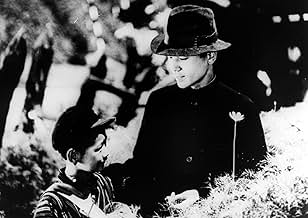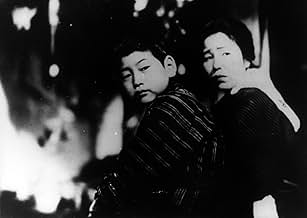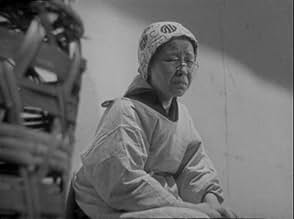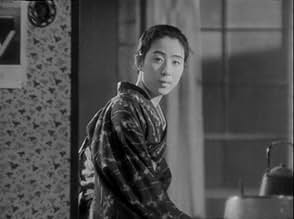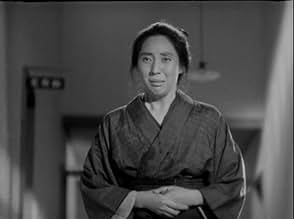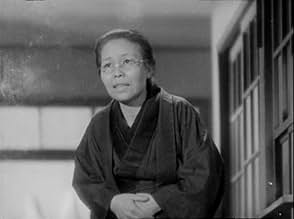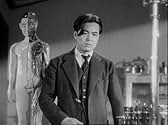CALIFICACIÓN DE IMDb
7.7/10
4.3 k
TU CALIFICACIÓN
Una viuda descubre que su único hijo se ha convertido en un humilde profesor.Una viuda descubre que su único hijo se ha convertido en un humilde profesor.Una viuda descubre que su único hijo se ha convertido en un humilde profesor.
- Dirección
- Guionistas
- Elenco
Jun Yokoyama
- Okubo's son
- (as Bakudan Kozô)
Tomio Aoki
- Tomibo
- (as Tokkan Kozô)
Seiichi Katô
- Kinjo no ko
- (as Seiichi Kato)
- Dirección
- Guionistas
- Todo el elenco y el equipo
- Producción, taquilla y más en IMDbPro
Opiniones destacadas
Incredibly gentle and touching Ozu picture about a single mother who works her butt off to send her only son off to school. Many years later, we follow her journey to visit that son in Tokyo. He hasn't kept in contact very well. His mother doesn't even know about his wife and infant son, nor that he is a grade school teacher, a rather low (and low-paid) position. Simply put, he's embarrassed at the little he has accomplished and he thinks his mother will be gravely disappointed that she went to so much trouble to educate him. The whole situation really hit home, and I was deeply moved by it. The film also features incredible cinematography and editing.
It's quite striking that although this film was made 17 years before Tokyo Story, all the aspects of the film-making style we have come to associate with Ozu are already fully present. But compare this film with, say, his "Sono yo no tsuma", made just six years earlier in 1930: in that film --- a rather slavish attempt to copy the style of German Realism -- none of the visual and narrative features he shows here are present.
No one has mentioned (so I will...) -- that the German film which Ryosuke takes his mother to see (in which she falls asleep, and of which he self-referentially says "this is what they call a talkie") is Willi Forst's 'Leise flehen meine Lieder' (Vienna, 1933), and the lovely blonde actress seen running through the wheatfields is Louise Ullrich. This film (now largely forgotten) was a popular sensation in Europe at the time, depicting the love affair between Franz Schubert and the Countess Eszterhazy. Also... noticeable in a few scenes in Ryosuke's house is a large travel poster which says 'Germany'. All of which shows the extent to which European film-making was in the mind of the young Ozu. We think of Ozu as a purely "domestic" Japanese director (in every sense of that word), but in fact he was well-versed in the traditions of western film-making.
No one has mentioned (so I will...) -- that the German film which Ryosuke takes his mother to see (in which she falls asleep, and of which he self-referentially says "this is what they call a talkie") is Willi Forst's 'Leise flehen meine Lieder' (Vienna, 1933), and the lovely blonde actress seen running through the wheatfields is Louise Ullrich. This film (now largely forgotten) was a popular sensation in Europe at the time, depicting the love affair between Franz Schubert and the Countess Eszterhazy. Also... noticeable in a few scenes in Ryosuke's house is a large travel poster which says 'Germany'. All of which shows the extent to which European film-making was in the mind of the young Ozu. We think of Ozu as a purely "domestic" Japanese director (in every sense of that word), but in fact he was well-versed in the traditions of western film-making.
"The Only Son" is Ozu's first "talkie" - and utilizes sounds in an efficient, restrained manner to help tell the story with calm grace. The beautiful simplicity that pervades the piece is classical Ozu, and amplifies the poignant tale of a mother coming back to visit her son, after sacrificing her livelihood to ensure he achieves higher education. When she realizes that he is unsatisfied with his life as a night-school teacher, a general melancholic tone begins to unfold through the progression of the narrative. The ending is nicely done, and overall, the film is crafted in that spare, simple perfection that is the stylistic hallmark of Ozu's cinema.
In 1923, in the province of Shinshu, the widow and simple worker of a silk factory Tsune Nonomiya (O-Tsune) decides to send her only son to Tokyo for having a better education. Thirteen years later, she visits her son Ryosuke Nonomiya (Shinichi Himori), and finds that he is a poor and frustrated night-school teacher with a wife, Sugiko (Yoshiko Tsubouchi), and a baby boy.
"Hitori Musuko" is a poignant, heartbreaking, sensitive and beautiful movie about expectations, frustrations, revelations and hope in life. Once again the major concern of Ozu is with the family and human relationship. In "Hitori Musuko", Ozu brilliantly uses the sound, recent in 1936, in the end of the simple but touching story, when the machines in the factory stop working symbolizing the death of Tsune. I saw this movie in a Brazilian cable television in a copy that certainly needs restoration, and I regret to inform that only "Ohayô" has been released on DVD in Brazil. Only in festivals, and occasionally in cable television, Brazilians have the chance to see the work of this great director. Seeing the number of votes of this masterpiece in IMDb (only 88 votes), I believe that the distribution problem of this film might be international. My vote is ten.
Title (Brazil): "Filho Único" ("Only Son")
"Hitori Musuko" is a poignant, heartbreaking, sensitive and beautiful movie about expectations, frustrations, revelations and hope in life. Once again the major concern of Ozu is with the family and human relationship. In "Hitori Musuko", Ozu brilliantly uses the sound, recent in 1936, in the end of the simple but touching story, when the machines in the factory stop working symbolizing the death of Tsune. I saw this movie in a Brazilian cable television in a copy that certainly needs restoration, and I regret to inform that only "Ohayô" has been released on DVD in Brazil. Only in festivals, and occasionally in cable television, Brazilians have the chance to see the work of this great director. Seeing the number of votes of this masterpiece in IMDb (only 88 votes), I believe that the distribution problem of this film might be international. My vote is ten.
Title (Brazil): "Filho Único" ("Only Son")
Of all the major directors in the world, Ozu was the last one to convert to sound; "The Only Son" was his first "all-talkie" film (in 1936), and it is remarkably inventive (technically) as well as deeply moving. Once again, his film deals with family dynamics: in this case, a widowed mother who has worked selflessly to provide her son with an education. But when she goes to visit him, she finds that he has not fulfilled his promise: he's stuck in a mediocre job, he has a wife and child and can't make any drastic changes because of his responsibilities. The ways that the mother and son try to reach an understanding, and their mutual resignation to the disappointments of life, create a glancing but powerful sense of that "quiet desperation" which was so often Ozu's theme.
¿Sabías que…?
- TriviaThis was Yasujirô Ozu's first feature film with all-synchronous dialogue.
- ConexionesFeatured in A Train Arrives at the Station (2016)
- Bandas sonorasOld Black Joe
Written by Stephen Foster
Selecciones populares
Inicia sesión para calificar y agrega a la lista de videos para obtener recomendaciones personalizadas
- How long is The Only Son?Con tecnología de Alexa
Detalles
- Tiempo de ejecución
- 1h 22min(82 min)
- Color
- Mezcla de sonido
- Relación de aspecto
- 1.37 : 1
Contribuir a esta página
Sugiere una edición o agrega el contenido que falta

